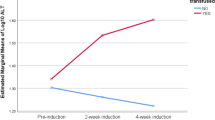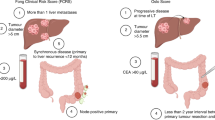Abstract
Thirty-six consecutive patients with breast cancer and liver metastases with abnormal liver biochemistry were treated with epirubicin 25 mg m-2 i.v. weekly. No dose modification was made for abnormal liver biochemistry, but dose intensity was adjusted by delaying treatment according to myelosuppression. The UICC overall response rate according to UICC criteria was 11/36 (30%) and median response duration was 27 weeks. Liver biochemistry improved in a further seven patients. Treatment was well tolerated. Epirubicin given in this way is effective in patients with breast cancer and liver metastases. An initial deterioration in liver biochemistry may occur before there is a response to epirubicin.
This is a preview of subscription content, access via your institution
Access options
Subscribe to this journal
Receive 24 print issues and online access
$259.00 per year
only $10.79 per issue
Buy this article
- Purchase on Springer Link
- Instant access to full article PDF
Prices may be subject to local taxes which are calculated during checkout
Similar content being viewed by others
Author information
Authors and Affiliations
Rights and permissions
About this article
Cite this article
Twelves, C., O'Reilly, S., Coleman, R. et al. Weekly epirubicin for breast cancer with liver metastases and abnormal liver biochemistry. Br J Cancer 60, 938–941 (1989). https://doi.org/10.1038/bjc.1989.394
Issue Date:
DOI: https://doi.org/10.1038/bjc.1989.394
This article is cited by
-
Interpatient Pharmacokinetic and Pharmacodynamic Variability of Carrier-Mediated Anticancer Agents
Clinical Pharmacology & Therapeutics (2012)
-
Weekly epirubicin in the treatment of gestational breast cancer (GBC)
Breast Cancer Research and Treatment (2009)



